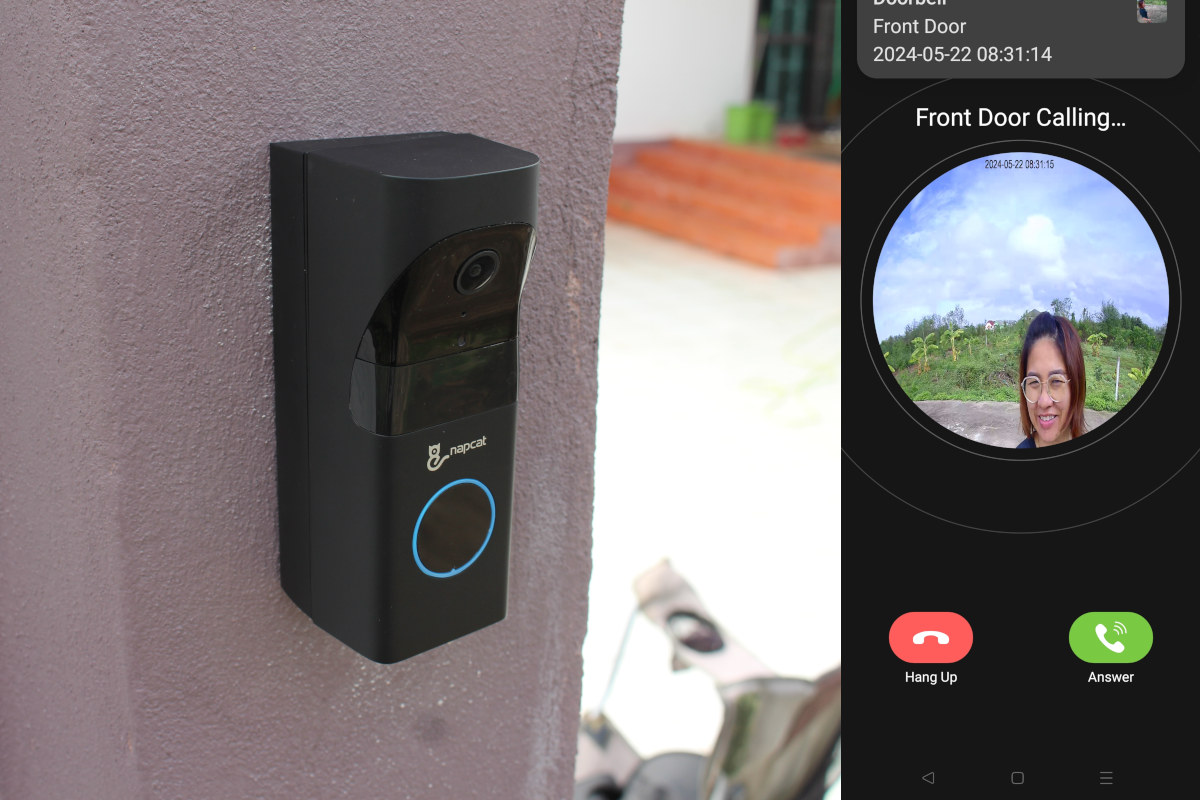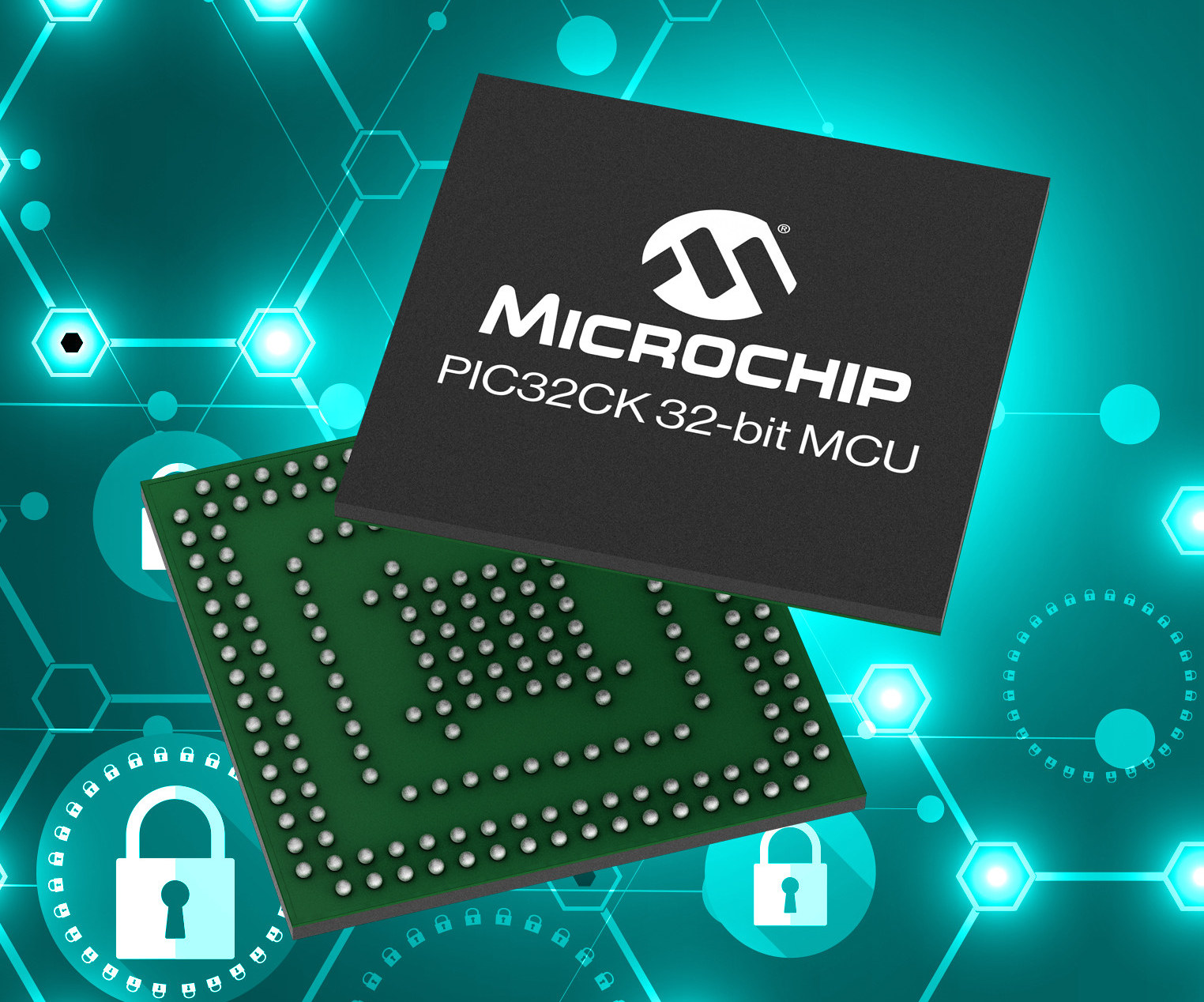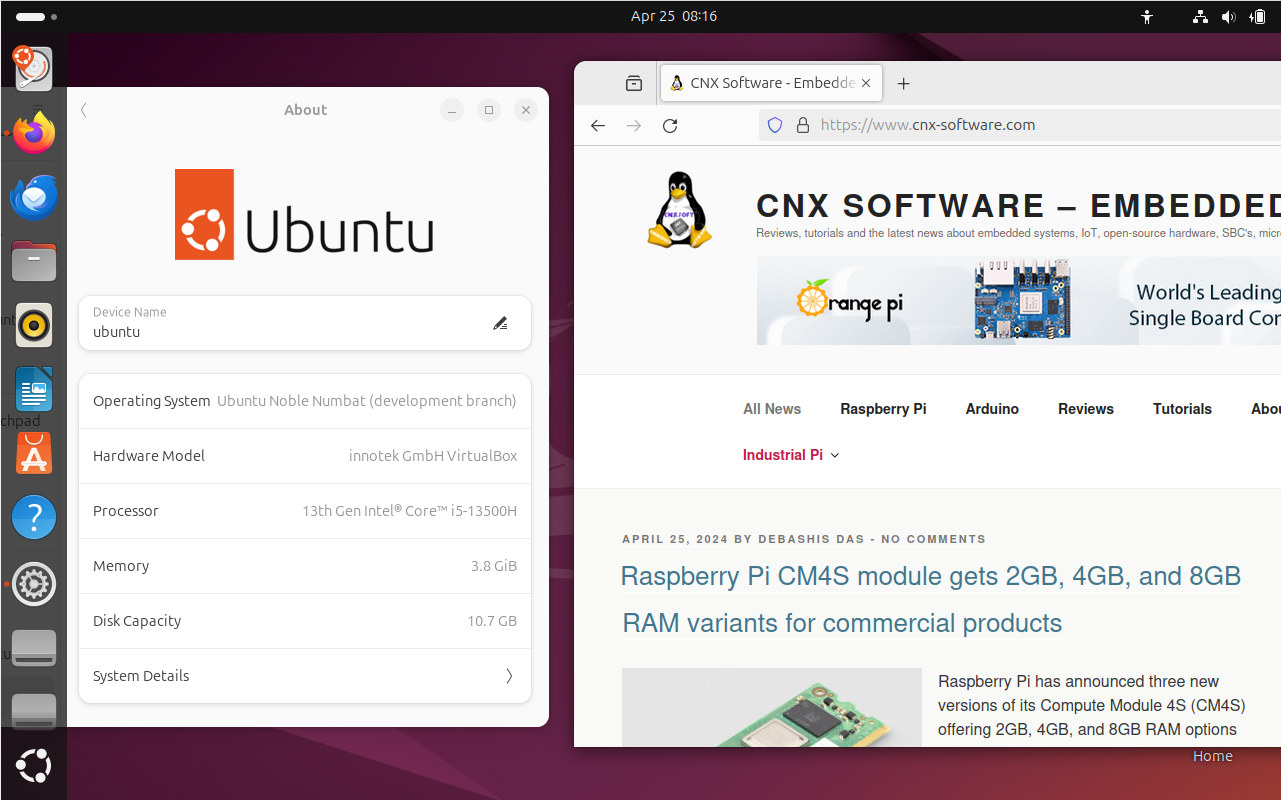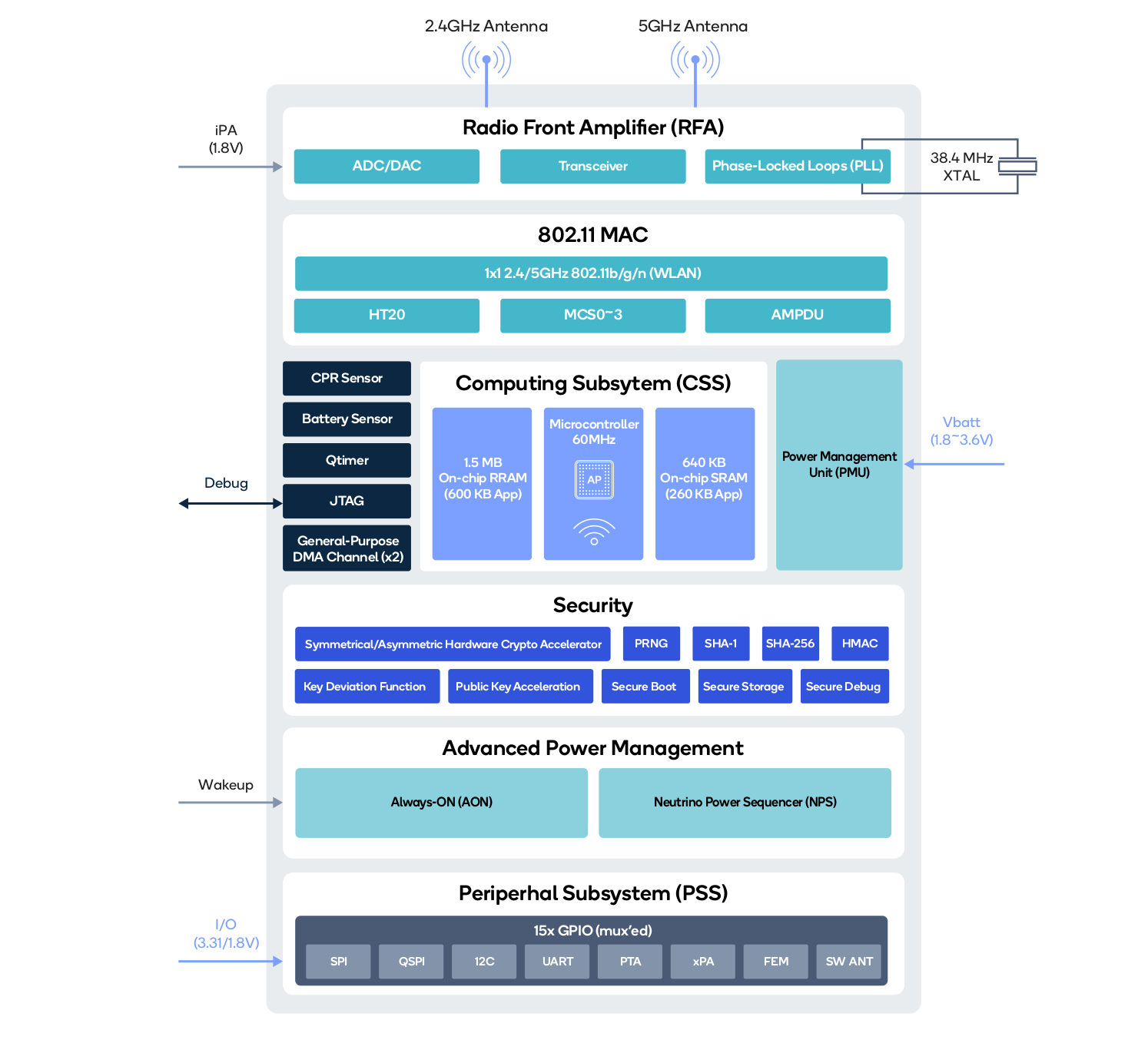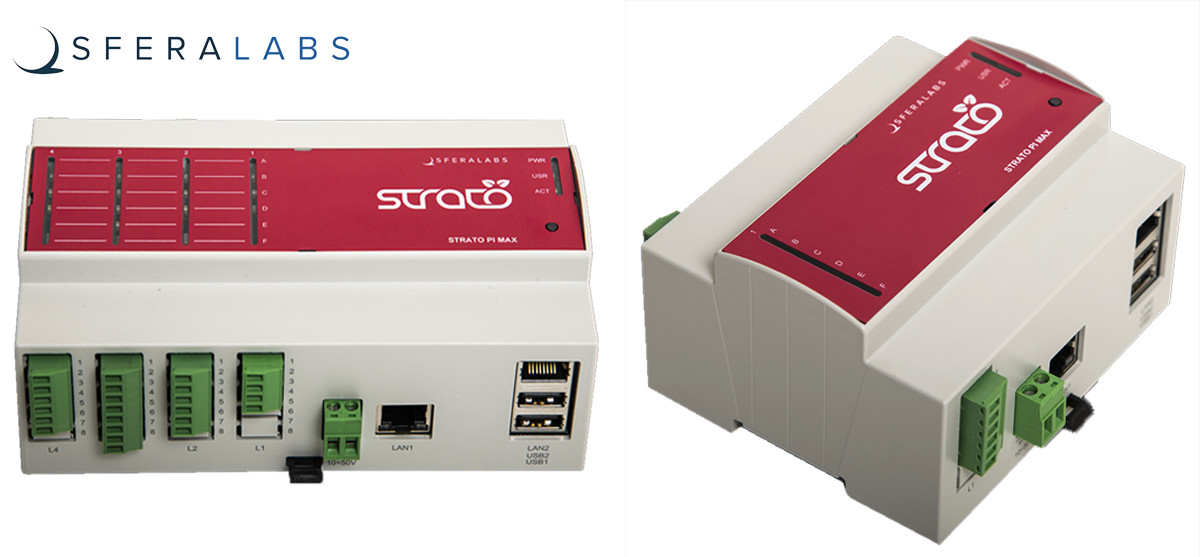The ESP32 Marauder Pocket Unit with GPS v2 is a portable Wi-Fi and Bluetooth penetration tool powered by an ESP32 module and used to test and analyze wireless networks. It features a 2.8-inch touchscreen, two 18650 batteries, an SD card slot, an LED battery indicator, and two external antennas for 2.4GHz Wi-Fi and GPS. ESP32 Marauder Pocket Unit v2 specifications: Microcontroller – ESP32 Wi-Fi & Bluetooth SoC Storage – MicroSD card slot for file sharing, backup, and firmware updates (8GB SanDisk memory card included) Display – 2.8-inch capacitive touchscreen USB – USB-C port for charging GNSS – Embedded GPS module Antenna – External dual antenna SMA connectors for WIFI and GPS Misc 1x battery status indicator Reset and Power buttons Power – 2x 18650 batteries Dimensions – 92 x 71 x 46mm The ESP32 Marauder device is based on JustCallMeKoko’s ESP32Marauder Project, a suite of Wi-Fi/Bluetooth offensive and defensive tools […]
NapCat Smart Video doorbell review – A battery-powered dual-band WiFi video doorbell with AI features
NapCat R112 is a 5MP video doorbell with dual-band 2.4/5GHz WiFi, AI features such as human and package detection, 2-way audio, and no subscription. It’s waterproof – rated IP65 – so it can be used outdoors, and powered by either a built-in battery or traditional wires. The company sent me a sample of the Napcat R112 for review. I’ll check out the camera in battery-powered mode only in this review, install it on the wall close to the gate of my house, and use the Napcast Android app to access the camera and answer calls. Napcat video doorbell unboxing The retail package shows a photo of the (white) base station and (black) camera and lists some of the main features such as a wide-angle camera, dual-power option, on-device human detection and package monitoring, and dual-band WiFi. There’s no monthly fee to pay to use the device after purchasing it. The […]
Microchip PIC32CK 32-bit Arm Cortex-M33 MCU combines Hardware Security Module with Arm TrustZone for IoT cybersecurity compliance
Microchip PIC32CK is a new family of 32-bit Arm Cortex-M33 microcontrollers clocked up to 120 MHz with Arm Trustzone and an optional integrated Hardware Security Module (HSM) that can help companies meet the cybersecurity requirements for consumer IoT devices and critical infrastructure mandated in the US, Europe, and other countries. Two sub-families are available with the PIC32CK GC and PICK32CK SG with the latter integrating the HSM, and the company claims it is the first 32-bit device on the market that combines an HSM with TrustZone technology for optional security. The PIC32CK is also said to support ISO 26262 functional safety and ISO/SAE 21434 cybersecurity standards. Microchip PIC32CK specifications: MCU core – Arm Cortex-M33 clocked at up to 120 MHz with 4KB combined instruction and data cache, TrustZone security Memory and Storage 128KB, 256KB, or 512KB SRAM 512KB, 1MB, or 2MB flash 128KB boot flash memory 64KB of configuration flash […]
Yocto Project 5.0 “Scarthgap” released with Linux 6.6 and plenty of changes
The Yocto Project 5.0 codenamed “Scarthgap” has just been released with Linux 6.6, glibc 2.39, LLVM 18.1, and over 300 other recipe upgrades. As a result of the release, the developers have made it available for download (bz2 tarball). The Yocto Project, or Yocto for shorts, is a popular framework used to create custom embedded Linux distributions, and we’ve played with it over the year showing how to create a minimal image for the Raspberry Pi, and last year, we used it again when reviewing two industrial development boards, namely the VOIPAC IMX8M and ADLINK i-Pi SMARC 1200. Yocto is quite a powerful framework/build system with plenty of options that make it highly customizable, but the learning curve is fairly steep. Some other changes in Yocto Project 5.0 include: New variables: CVE_DB_INCR_UPDATE_AGE_THRES: Configure the maximum age of the internal CVE database for incremental update (instead of a full redownload). RPMBUILD_EXTRA_PARAMS: […]
Ubuntu 24.04 LTS “Noble Numbat” released with Linux 6.8, up to 12 years of support
Canonical has just released Ubuntu 24.04 LTS “Noble Numbat” distribution a little over two years after Ubuntu 22.04 LTS “Jammy Jellyfish” was released. The new version of the operating system comes with the recent Linux 6.8 kernel, GNOME 46, and a range of updates and new features we’ll discuss in this post. As a long-term support release, Ubuntu 24.04 LTS gets a 12-year commitment for security maintenance and support, with five years of free security maintenance on the main Ubuntu repository, and Ubuntu Pro extending that commitment to 10 years on both the main and universe repositories (also free for individuals and small companies with up to 5 devices). This can be extended a further 2-year, or 12 years in total, for Ubuntu Pro subscribers who purchase the Legacy Support add-on. Canonical explains the Linux 6.8 kernel brings improved syscall performance, nested KVM support on ppc64el, and access to the […]
Qualcomm QCC730 low-power Arm Cortex-M4F WiFi 4 SoC targets battery-powered IoT applications
Qualcomm has unveiled the “micro-power” QCC730 Arm Cortex-M4F dual-band WiFi 4 microcontroller for the IoT market that targets similar applications as the Espressif ESP32 microcontrollers but potentially at lower power consumption with claims of up to 88% lower power than “previous generations” making it suitable for battery-powered industrial, commercial and consumer applications. To highlight the low-power consumption, the company also mentions that QCC730 devices could become high-performance alternatives to Bluetooth IoT solutions with direct cloud connectivity. Qualcomm QCC730 specifications: CPU core – Arm Cortex-M4F @ 60 MHz Memory/ Storage 1.5 MB RAM, including 600KB for user app (On-chip RRAM (NVM) to host application without the need for an external NOR flash) 640 KB SRAM, including 260KB for user app XiP over QSPI Flash Wi-Fi Standards: 802.11b, 802.11g, 802.11n, 802.11a Spectral Bands: 2.4 GHz, 5 GHz Channels: 20 MHz Antenna Configuration: 1×1 Features: up to MCS3 Interfaces – Master I2C, 15x […]
The New IoT Device Security Specification 1.0 unifies various standards into one
The Connectivity Standards Alliance has recently introduced its IoT Device Security Specification 1.0, a way to defragment many security standards into one. This common scheme and certification standard will ensure that devices meet local requirements in each country. With this approach, a single test from the alliance ensures that the product can be sold globally without any compliance issues. IoT Device Security Specification 1.0 at a glance: Unified Security Standard – Integrates the major cybersecurity baselines from the United States, Singapore, and Europe into one comprehensive framework. Product Security Verified Mark – A new certification mark that indicates compliance with the IoT Device Security Specification, designed to enhance consumer trust and product marketability. No Hardcoded Default Passwords – Ensures all IoT devices utilize unique authentication credentials out of the box, improving initial security. Unique Identity for Each Device – Assigns a distinct identity to every device, crucial for traceability and secure […]
Sfera Labs Strato Pi Max DIN rail industrial controllers are built around Raspberry Pi CM4 or Zymbit SCM module
Sfera Labs has recently introduced two new Pi Max DIN rail industrial controllers – the Strato Pi Max XS and Strato Pi Max XL configured with a Raspberry Pi CM4 or the Zymbit Secure Compute Module (SCM). Both have options for different RAM and eMMC flash configurations and can come with or without wireless connectivity. The module also features a Raspberry Pi RP2040 microcontroller that manages tasks such as power management and boot sequence control. Additionally, it enables connections to the CM4 module through I²C, USB, and UART. Strato Pi Max industrial controller specification Base Module – Raspberry Pi Compute Module 4 or Zymbit SCM options. Microcontroller – Raspberry RP2040 dual ARM Cortex-M0+ at 133 MHz. Storage – eMMC, microSD (dual for XL), M.2 PCIe SSD. Connectivity – Wi-Fi, BLE, dual Ethernet ports (GbE and 100MbE). USB – 2x USB 2.0 ports with power control and fault detection. Sensors – 3-axis accelerometer. Cooling – Internal […]



